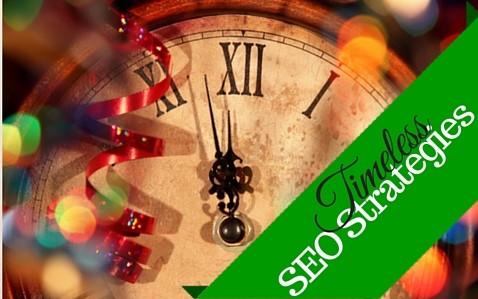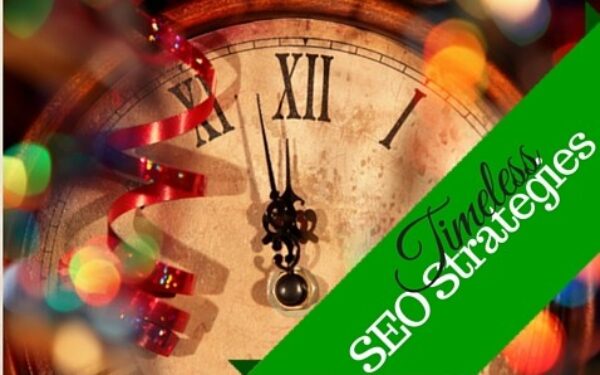Hello and Happy New Year! It’s that time again- resolutions, yearly goal-setting, stated commitments, and all the other commonalities of starting a new year. In business, this includes your [internet] marketing strategy. However, if you are even slightly familiar with Search Engine Optimization, you know that strategies have to constantly change. What worked last year may be considered as black-hat this year. All-mighty Google may punish you for something that worked just last month! So, instead of making the first blog post of 2016 about trends you should expect to see coming in the new year, we decided to take a different approach-
Start the year off right by going back to basics. Brush up on “must-have” foundations of SEO. Commit to improve the fundamentals of your optimization efforts first, then worry about the latest trends (or let us do the heavy lifting).

Timeless SEO Strategies
SEO strategy can be broken down into two separate categories search engines look at when evaluating a site against all others on the web: On-page SEO and Off-page SEO. While on-page focuses on what a site/page is about, off-page deals with popularity and authority. Basically, on-page SEO determines what you rank for, while off-page SEO determines how high you will rank.
On-Page SEO
With correct on-page SEO, both customers and search engine robots should be able to understand what your site is about and navigate through the structure and content easily. Good on-page will allow search engines to index your web pages with ease and rank your website accordingly.
Basic on-page optimization efforts include:
Title Tags
Considered one of the most important elements in on-site SEO, title tags appear in three key areas: browsers, search engine results pages, and external websites. Make sure targeted keywords are in each page of your site.
Headings
Headings, specifically H1 tags, help search engines grasp the main topics of a long post. They are typically the largest words on the page, and therefore carry a little more weight than the rest of the page copy.
URL Structure
The use of important, relevant keywords in your URLs make it easy for both user and search engines to know what the page, and your website, is all about.
Meta Tags
A page’s meta tag summarizes what the page is all about to search engines. This is just another basic, simple way to utilize relevant keywords and easily help your ranking.
Image Alt Text
Alt text is used by screen reader software to help blind internet users understand the content of your images, and search engines use them in a similar way. Therefore, relevant keyword usage to describe the image help search engines yet again understand your page’s content.
Page Load Speed
Part of good UX, or “user experience” is being able to help users find the information they are looking for as fast as possible. The faster your page(s) load, the happier the user, therefore helping your page rank higher in search engines.
Internal Linking
Linking internally is useful to users because it keeps relevant information flowing and on your website longer. It’s useful to search engines because it helps tie in relevancy, therefore helping with rank factors.
Page Content
Ultimately the most important for on-page SEO. Content needs to be relevant, useful, and provide value. Search engines have various ways to measure if page content is useful and relevant.
Off-Page SEO
Think of off-page SEO as the promotion and marketing efforts outside of your website. It is a popularity contest, of sorts, and a way for search engines to really get a grasp on how the rest of the [online] world views your site.
Here are two of the off-page SEO practices:
Link Building
It’s all about quality and quantity. Creating shareable content is the first step to earning valuable links that will help your off-page SEO efforts. Think of it as “votes” to your website. If your link happens upon another website with serious Trust and Domain Authority (think Fortune 500 companies, .edu or .org, etc.), that speaks volumes for your website. There is no set amount of how many links one would need to help their off-page SEO; factors like industry, competition, and Domain Authority come into play. However, keep in mind search engines have come down hard on penalizing anyone who buy links or submits their links to link directories in order to link build and manipulate Page Rank and increase Domain Authority.
Social Media
Although almost all of the links from social media sites are “nofollow,” this does not mean that they do not have any value to you. Social Media mentions are gaining some serious ground as ranking factors and proper configuration of social media profiles can help boost SEO as well. If nothing else, it’s a great way to send traffic to your website and [hopefully] users will be intrigued enough to stay and check out multiple pages.
On-page SEO and off-page SEO work together to help improve your website’s rank on search engines. Think of SEO like building a house. On-page SEO is the foundation. You have to set the foundation first before you can build the rest of the house. You also may have to come back from time to time and do maintenance on your foundation [on-page SEO]. Off-page is the actual house, where you build and can continuously add on. Throw house parties [great content], gain popularity, and win yard of the month [Domain Authority/Trust/Rank]!

